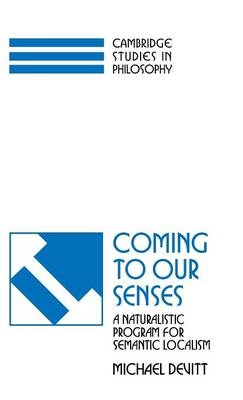
Coming to our Senses
A Naturalistic Program for Semantic Localism
Seiten
1995
Cambridge University Press (Verlag)
978-0-521-49543-1 (ISBN)
Cambridge University Press (Verlag)
978-0-521-49543-1 (ISBN)
Michael Devitt is a distinguished philosopher of language. In this book he takes up one of the most important difficulties that must be faced by philosophical semantics: namely, the threat posed by holism. This important study will be of particular interest to philosophers of language and mind, and could be used in graduate-level seminars in these areas.
Michael Devitt is a distinguished philosopher of language. In this book he takes up one of the most important difficulties that must be faced by philosophical semantics: namely, the threat posed by holism. Three important questions lie at the core of this book: what are the main objectives of semantics; why are they worthwhile; how should we accomplish them? Devitt answers these 'methodological' questions naturalistically and explores what semantic programme arises from the answers. The approach is anti-Cartesian, rejecting the idea that linguistic or conceptual competence yields any privileged access to meanings. This new methodology is used first against holism. Devitt argues for a truth-referential localism, and in the process rejects direct-reference, two-factor, and verificationist theories. The book concludes by arguing against revisionism, eliminativism, and the idea that we should ascribe narrow meanings to explain behaviour.
Michael Devitt is a distinguished philosopher of language. In this book he takes up one of the most important difficulties that must be faced by philosophical semantics: namely, the threat posed by holism. Three important questions lie at the core of this book: what are the main objectives of semantics; why are they worthwhile; how should we accomplish them? Devitt answers these 'methodological' questions naturalistically and explores what semantic programme arises from the answers. The approach is anti-Cartesian, rejecting the idea that linguistic or conceptual competence yields any privileged access to meanings. This new methodology is used first against holism. Devitt argues for a truth-referential localism, and in the process rejects direct-reference, two-factor, and verificationist theories. The book concludes by arguing against revisionism, eliminativism, and the idea that we should ascribe narrow meanings to explain behaviour.
Introduction; 1. A critique of the case for semantic holism; 2. The methodology of naturalistic semantics; 3. A case for semantic localism; 4. Meanings and their ascription; 5. Eliminativism and revisionism.
| Erscheint lt. Verlag | 27.10.1995 |
|---|---|
| Reihe/Serie | Cambridge Studies in Philosophy |
| Verlagsort | Cambridge |
| Sprache | englisch |
| Maße | 140 x 216 mm |
| Gewicht | 600 g |
| Themenwelt | Geisteswissenschaften ► Philosophie ► Philosophie der Neuzeit |
| Geisteswissenschaften ► Philosophie ► Sprachphilosophie | |
| ISBN-10 | 0-521-49543-1 / 0521495431 |
| ISBN-13 | 978-0-521-49543-1 / 9780521495431 |
| Zustand | Neuware |
| Haben Sie eine Frage zum Produkt? |
Mehr entdecken
aus dem Bereich
aus dem Bereich


